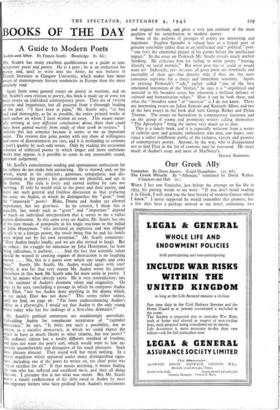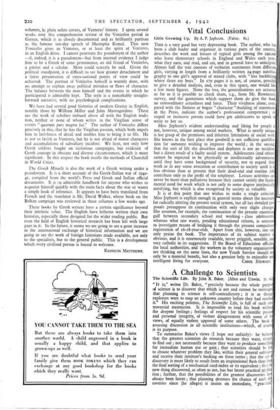Our Greek Ally
Venizelos. By Doros Alastos. (Lund Humphries. 123. 6d.) The Greek Miracle. By "Athenian," translated by David Walker. (Chapman and Hall. 6s.) WHEN I last saw Venizelos, just before the attempt on his life in 1933, his parting words to me were : " If you don't mind reading it in Greek, I will send you the best history of modern Greece which I know." I never supposed he would remember this promise, but a few days later a package arrived at my hotel, containing two
volumes, in plain ochre covers, of Venteres' history. I spent several weeks over this comprehensive review of the Venizelos period in Greece, which is as closely documented and as brilliantly partisan as the famous ten-day speech of Mustapha Kemal. This new Venizelos gives us Venteres, or at least the spirit of Venteres, in an English dress. I cannot penetrate the pseudonym of the author —if, indeed, it is a pseudonym—but from internal evidence I judge him to be a Greek of some prominence, an old friend of Venizelos, a patriot and a scholar. More could scarcely be said. Given the political standpoint, it is difficult to see how greater detachment and a fairer presentation of extra-national points of view could be achieved. The portrait of Venizelos himself is warmly done, with no attempt to explain away political mistakes or flaws of character. The balance between the man himself and the events in which he participated is admirably kept. The style is a remarkably straight- forward narrative, with no psychological complications.
We have had several good histories of modern Greece in English, notably those by William Miller and John Mavrogordato. These are the work of scholars imbued above all with the English tradi- tion, neither or none of whom writes in the Virgilian sense of events "quorum pars magna fui." The author of -Venizelos differs precisely in this, that he has the Virgilian passion, which both impels him to lavishness of detail and enables him to bring it to life. He is not so lavish as Venteres, but he is not afraid of minor characters and accumulations of subsidiary incident. We hear, not only how Greek soldiers fought on victorious campaigns, but evidence of Greek courage in obscure and diverse circumstances, which is more significant. In this respect the book recalls the methods of Churchill in World Crisis.
The Greek Miracle is also the work of a Greek writing under a pseudonym. It is a short account of the Greek-Italian war of 594o- 45, compiled from the world's Press and Greek and Italian official documents. It is 1•11 admirable handbook for anyone who wishes to acquaint himself quickly with the main facts about the war or wants a simple book of reference. It appears to have been translated from French and the translator is Mr. David Walker, whose book on the Balkan campaign was reviewed in these columns a few weeks ago.
These books by Greek writers have a certain significance beyond their intrinsic value. The English have hitherto written their own histories, especially those designed for the wider reading public. But even the field of English historical research has been left with large gaps in it. In the future, it seems we are going to see a great increase in the international exchange of historical information and we are going to see the work of foreign historians made available, not only to the specialists, but to the general public. This is a development Which every civilised person is bound to welcome.
KENNETH MATTHEWS.



























 Previous page
Previous page